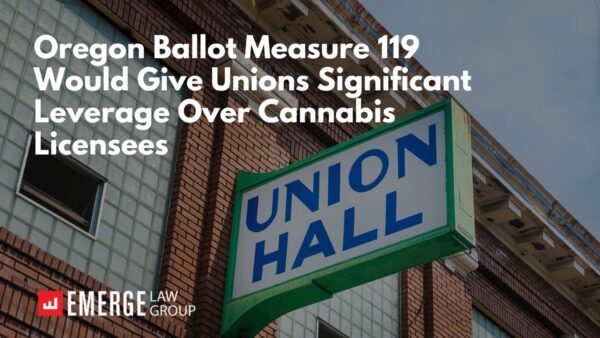CannaBeat is a curated biweekly selection of top new stories impacting business, research, and culture in the cannabis industry, crafted by Emerge Law Group.
Emerge’s Hot Take
FDA Concludes That Existing Regulatory Frameworks for Foods and Supplements Are Not Appropriate for Cannabidiol, Will Work With Congress On a New Way Forward
The US hemp industry has been waiting eight years – since the 2014 Farm Bill opened a window for legal hemp-derived cannabinoid products –to see how the Food and Drug Administration (“FDA”) plans to regulate consumable CBD products. Although the FDA has always insisted that consumable CBD products violate the Food, Drug & Cosmetic Act, they have largely only enforced against CBD manufacturers who make egregious medical claims about their products. In 2019, after the 2018 Farm Bill formally legalized and regulated hemp, the FDA seemed to offer the industry an olive branch when it convened a working group to “explore potential pathways for dietary supplements and/or conventional foods containing CBD to be lawfully marketed.”
Nearly four years later, the FDA has thrown up its hands and punted to Congress. On January 26, 2023, the FDA concluded that it will not pursue a legal pathway for these products, but instead look to Congress to set the initial regulatory structure through new legislation. In the meantime, the FDA has emphasized that it will continue to take action against CBD manufacturers “when appropriate.”
The CBD industry now must depend on a divided and dysfunctional Congress to learn its fate, and will continue to occupy a dubious legal landscape, as it has for eight years, and four years since CBD was “legalized,” unless and until Congress acts.
“This decision is a double-edged sword,” according to Emerge Law Group’s Alex Berger, “on one hand, consumable CBD products remain federally illegal, with no pathway to legality. On the other, FDA has not taken serious enforcement actions against conscientious manufacturers who avoid making unapproved and unfounded medical claims. Nor do they have the resources to do so, given the ubiquity of CBD out there. If FDA had made new regulations requiring everyone go through a complex and expensive approval process, it could have left the industry worse off.”
Other Noteworthy News
Ninth Circuit Affirms Dismissal of RICO Claims Relating to Cannabis
Plaintiff Francine Shulman took advantage when recreational marijuana was legalized in California and started a cannabis cultivation operation. At some point, she needed financial back and guidance, so she partnered with Defendant Todd Kaplan. They and their various business entities entered into agreements, which Shulman ultimately claims were used to defraud her out of her assets and licenses. Shulman filed a lawsuit in the Central District of California, a federal court, because two claims involved violations of RICO and two other claims involved violations of the Lanham Act (both federal statutes). […] n the January 18, 2023 Opinion and Order, the three-judge panel unanimously affirmed Judge Birotte’s ruling. They held Shuman lacked standing to bring RICO claims because in order to establish statutory standing under the statute, a plaintiff must show: “(1) that his alleged harm qualifies as injury to his business or property; and (2) that his harm was by reason of the RICO violation, which requires the plaintiff to establish proximate causation.” However, because Shulman’s “business or property” entails the cultivation, sale, and marketing of cannabis – which is all illegal under federal law – her “harm” wasn’t something that could then be remedied by federal law.
Presidential Pardons for Federal Cannabis Possession Convictions Still Unavailable
It’s time for the Department of Justice to deliver the pardon certificates that President Biden promised last fall. The President announced the issuance of marijuana-specific pardons on October 6, 2022 as part of a widely supported set of actions recognizing the folly of federal cannabis prohibition. Thousands of people with federal criminal records for simple marijuana possession are eligible for a pardon that would help them obtain employment, housing, education, and more. Unfortunately, more than three months later, the Department of Justice pardon website indicates that the applications to obtain a pardon certificate are still unavailable.
How Marijuana Companies Are Building Loyalty by Selling Seeds to Consumers
Several cannabis companies have added marijuana seeds to their line of product offerings – even though the move, at first blush, might seem counterintuitive. Why, for one, would marijuana companies want consumers to grow their own plants? Yet, there’s a logic here: Consider how people who grow their own vegetables also shop for fresh veggies at a grocery store or farmers market. “Everybody who’s got a home garden during the spring and the summer grows tomatoes. But 98% of the tomatoes they buy are at a store,” said Carl Giannone, co-founder of Trade Roots, a cannabis company based in Wareham, Massachusetts, that sells seeds direct to consumers. “If growing tomatoes makes them want to buy tomatoes, then I want to let them grow.” An increasing number of companies are offering seeds thanks to a change in federal policy. The move can be profitable for some, while others are doing it to build brand loyalty and share genetics.
The CannaBeat Podcast
From The Archives: Episode 4 - Commercial Lending to Cannabis Companies
Delia and Jay discuss commercial loans for cannabis companies with North Bay Credit Union's chief lending officer Robert Goebel
Subscribe to CannaBeat by Emerge Law Group
CannaBeat is a curated biweekly selection of top news stories impacting business, research, and culture in the cannabis industry, crafted by Emerge Law Group, delivered straight to your inbox. Click here to subscribe!





